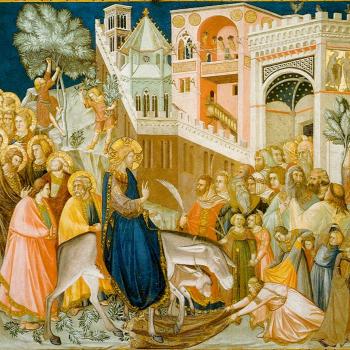In debates about Christian origins, one tiresome canard is going to come up sporadically, and usually, it’s not worth wasting time on. As I have seen it surface a few times of late, let’s deal with the point here.
Briefly, if you are discussing Jesus of Nazareth, you can make any argument you choose to offer. If you wish, you can deny or challenge pretty much any aspect of the story told in the gospels, and present Jesus or his contemporaries in the most sinister or demeaning light possible. We can then argue about the evidence offered for any particular point. What you can’t do, though, without venturing into the far swamps of extreme crankery, is to argue that Jesus never existed. The “Christ-Myth Hypothesis” is not scholarship, and is not taken seriously in respectable academic debate. The grounds advanced for the “hypothesis” are worthless. The authors proposing such opinions might be competent, decent, honest individuals, but the views they present are demonstrably wrong.
In no particular order:
Philosophically, say the mythicists, you can’t prove a negative, and it’s up to believers to present an affirmative case for anything, including the historical existence of Jesus. Fair enough.
The affirmative evidence for that existence is easily offered, consisting as it does of a sizable body of writings dating from within a half century of the events described. Those documents are, without question, the most closely debated and analyzed in human history. A vast body of scholars works on those texts and their implications, and they come from a wide body of religious backgrounds – Christians of every possible shade, Jews, skeptics and atheists, and people of various other faiths. Within that scholarly universe, the number of qualified scholars who today deny the historical existence of Jesus is infinitesimal. The consensus on that matter is near-total.
A similar comment applies to historians, literary scholars and philosophers who study the ancient world without necessarily focusing on religious matters, but who touch on Jesus and his times. If they find a book that argues against Jesus’s existence, they cough politely and move on.
Before anyone complains about using scholarly consensus as an argument, and vaunting instead the virtues of heroic dissidents and heretics, please read some of the quite numerous pieces I have written about those issues. So no, those mainstream scholars are not terrified to venture into nonconformity, they are not hidebound bigots, they just see no reason to argue about such a blatantly obvious point.
As I have stated repeatedly, “Scholarship is what scholars do, and if they don’t do it, it’s not scholarship.” That is by far the most important point against the mythicists, and really, nothing more needs to be said.
To take some specific objections that they make, though:
*Contemporary writers do not refer to Jesus
That depends what we mean by “contemporary.” In his lifetime and very brief period of celebrity, there are no such references. Very shortly afterwards, there are lots.
The writings of Paul can reliably be dated to the year between, say, 48 and 64 AD. If we take the letters most credibly attributed to Paul (Romans, 1 and 2 Corinthians, Galatians, 1 and 2 Thessalonians) they include around 130 uses of the term “Jesus Christ” or “Christ Jesus.” If we take other letters like Colossians and Ephesians, the number rises sizably. As that usage makes it obvious that the term “Christ” refers to the same person, then we should add the many examples of that word used without the “Jesus.” We can argue about Paul’s understanding of the importance of the human Jesus, as opposed to the resurrected Christ, but he clearly believed in the physical existence of that Jesus. That does not take us to Jesus’s lifetime, but to very shortly afterwards.
But you can take Paul entirely out of the story, and still have all the evidence you need. The gospels were not of course written during Jesus’s lifetime, but they use traditions that clearly do provide a direct linkage to a historical individual. The quality of historical sources depends on how directly they can be connected to events, and how plausible the chain of connection. All the canonical sources depict a very plausible Jesus in a very identifiable early first century historical setting. More significant, there are clear and well understood chains of evidence and tradition from Jesus’s time to the writing of those gospels.
The overwhelming weight of what we know about the emergence of the Jesus Movement between 30 and the 80s, say, shows a potent continuity of historical memory. Bart Ehrman’s latest book Jesus Before the Gospels raises questions about how far that memory can be reliably used for specific details, for any particular act or saying of Jesus. Fair enough, and let’s debate those points: to say the least, Ehrman is a competent and credible scholar, although I think he goes too far here. But Jesus’s existence as some kind of myth or false memory? No way. (Obviously, that is not what Ehrman is arguing!)
Accounts of Jesus as a mythical otherworldly being without worldly roots belong to much later sources, in alternative gospels of the second or third centuries, or later. Citing alternative works from that era – or much later Jewish texts – as if they have some kind of superior hotline to the historical reality of the 20s AD is just not permissible, and is actually scandalous.
Let me put this as simply as I can: Jesus is better documented and recorded than pretty much any non-elite figure of antiquity.
*Jesus features in no contemporary secular or non-Christian literary sources.
Jesus’s activities were at the time strictly limited in their perceived importance, and it would be astounding – dare I say, miraculous – if any contemporary did make such a comment. The range of strictly contemporary sources commenting on the region in that era, roughly the 20s-30s AD, is tiny. I dearly wish we had the police blotter of the Jerusalem Post-Intelligencer for those years, but we don’t.
Just why would anyone refer to Jesus in writing at this time?
Just to illustrate how fatuous that objection is, Philo of Alexandria does not refer to Jesus, although he was working at the time. But why on earth would he have heard of such an affair in a neighboring land at the time, or thought it of the slightest significance, any more than a dozen other messianic claimants? And that would be even assuming the story had any relevance to anything he happened to be working on. Jesus did not matter to any elite writer at the time. As his followers grew in number, they did come to matter, and it is only at that point that non-Christian writers begin to pay any attention.
The volume and chronology of the literature we have about Jesus in the first few decades following his death is thus pretty much exactly what we would expect.
*Jesus does not feature in early non-Christian literary sources who might have been expected to mention him.
As we have his writing today, the historian Josephus has a description of Jesus which, beyond doubt, is a bogus interpolation by a clumsy Christian editor. Josephus assuredly wrote no such thing as the Testimonium Flavianum. It is however all but certain that Josephus originally had a reference to Jesus at that point, although it was probably demeaning or hostile, and that is why it was changed. Some scholars think that what he actually wrote can be reconstructed plausibly, others think it has been lost beyond hope. I have an open mind on that.
To get the tone of what he might have said there, though, then go to Book 20 of his Jewish Antiquities, where we read of an incident in the 60s AD:
As therefore Ananus was of such a disposition, he thought he had now a good opportunity, as Festus was now dead, and Albinus was still on the road; so he assembled a council of judges, and brought before it the brother of Jesus the so-called Christ, whose name was James, together with some others, and having accused them as lawbreakers, he delivered them over to be stoned.
That is a reference to Jesus, who was called Christ, or better, the so-called Messiah (ho legomenos christos), and it is clearly original. Would any later Christian have included such a skeptical phrase? It is amazing that legomenos survives in the manuscripts, but it does. Josephus, then, knows of and mentions Jesus, and he was as well acquainted with the records of first century Palestine as anyone. We don’t have his lengthier and more hostile account, but we can be sure it was there.
Josephus, in short, wrote about Jesus as a real, known, individual, who served as a useful point of reference (“You know who that James was? Why, he was the brother of Jesus”). And if his brother perished in the 60s, that provides serious limits to Jesus’s actual date. Maybe the actual dating of the death around 30 AD might be off by a couple of years either way, but not by (say) several decades.
That is also decisive in another way. Some mythicists argue that Paul’s Jesus was a fictional or mythical concoction, yet here he is, cited as a real historical character by a very well informed historian who knew Galilee well. There is no reason to think that Josephus regarded Jesus any differently from any other of the sackful of messiahs that appeared during that century.
*There are no contemporary references to Jesus in non-literary sources, bureaucratic or otherwise
Look at the non-elite individuals recorded in contemporary legal texts, such as the Oxyrhynchus Papyri. How many individuals are recorded there, and what proportion of the population of the Near East at the time do they represent? In other words, what were the odds that any individual from this time would be recorded in documents that survive, whether we are looking at wills, contracts, court proceedings, or anything else? Or indeed, any writings about those people? I’m still trying to come up with a better word than “infinitesimal” or “microscopic.” Nanoscale?
A similar comment applies to material remains such as monuments and grave markings. Only a microscopic proportion of the number of non-elite people appear in items of that sort that happen to survive and have been recorded. I don’t believe in the so-called James Ossuary, although it continues to attract believers.
You’ll note that I use the word “non-elite” frequently, and that is vital. Don’t ever try to compare what we know about Jesus with our evidence for (say) the Emperor Tiberius. Elite people often (by no means always) left some mark in the historical record, non-elite people generally did not.
Let me draw a critical distinction here. Those various strictly contemporary sources give us a wonderful idea of the society at the time, in Palestine, Egypt or wherever, and they confirm what we read in the literary evidence, often to an uncanny degree. But as to producing records of a specific individual that we are seeking information on? No.
*Jesus left no writings.
No, really, I have seen that objection made with a straight face.
Please give me a list of early first century non-elite individuals who have left actual writings of their own that survive. You should include all messianic candidates and charismatic prophets. How long is your list?
Even if we look at truly elite people, it’s depressing to read of the substantial works they wrote that once existed, but no longer do. Just to take one example, in Rome at just this time, the pivotal imperial woman Agrippina the Younger wrote a family history that we would dearly like to read, but it has been lost irretrievably for many centuries. You could actually produce a lengthy catalogue of similar works that we know once existed, but which don’t any more – in fact, they would fill many imaginary libraries. And we wonder that we have nothing from a rabbi from Nazareth?
*”Jesus” was actually a disguised or confused memory of another historical character, such as [insert ludicrous candidate here, from Teacher of Righteousness onward].
These theories are fun, and much like London buses, don’t worry if you miss one, there’ll be another one along in a few minutes. For the arguments against these various candidates, check out “scholarly consensus” above.
At some point in this process too, Ockham’s Razor comes into play, namely “Entities must not be multiplied beyond necessity.” So what’s wrong with accepting the simple, straightforward explanation, namely that the really well-documented historical Jesus we know is the one the ancient books are talking about?
*”Jesus” was a mythical figure like those of the ancient mystery religions, with many analogies to figures in other world religions, such as Krishna or even Buddha.
Ah, the golden oldies.
Look for dates with publication dates before 1920 or so, and those theories run riot. Usually, they arose from superficial knowledge of those other faiths, commonly by people with a Christian background who projected those understandings into other religions, where they did not belong. We now know vastly more about the cults of figures like Attis, Adonis, Tammuz, and the rest than we did a century ago, and the more we know, the less they fit the “dying and rising god” propounded by great writers of historical fiction like Sir James Frazer, of Golden Bough fame.
As to the degree of resemblance to Christian stories, I am reminded of G. K. Chesterton’s complaint about people who “are always insisting that Christianity and Buddhism are very much alike, especially Buddhism.”
So count the credentialed scholars today who give such “Christ was a version of other myth figures” theories a moment’s credence. Do you get to double figures?
Some issues are worth arguing about, others aren’t. Jesus of Nazareth existed. As to what he said and did, we can discuss that at leisure.
















